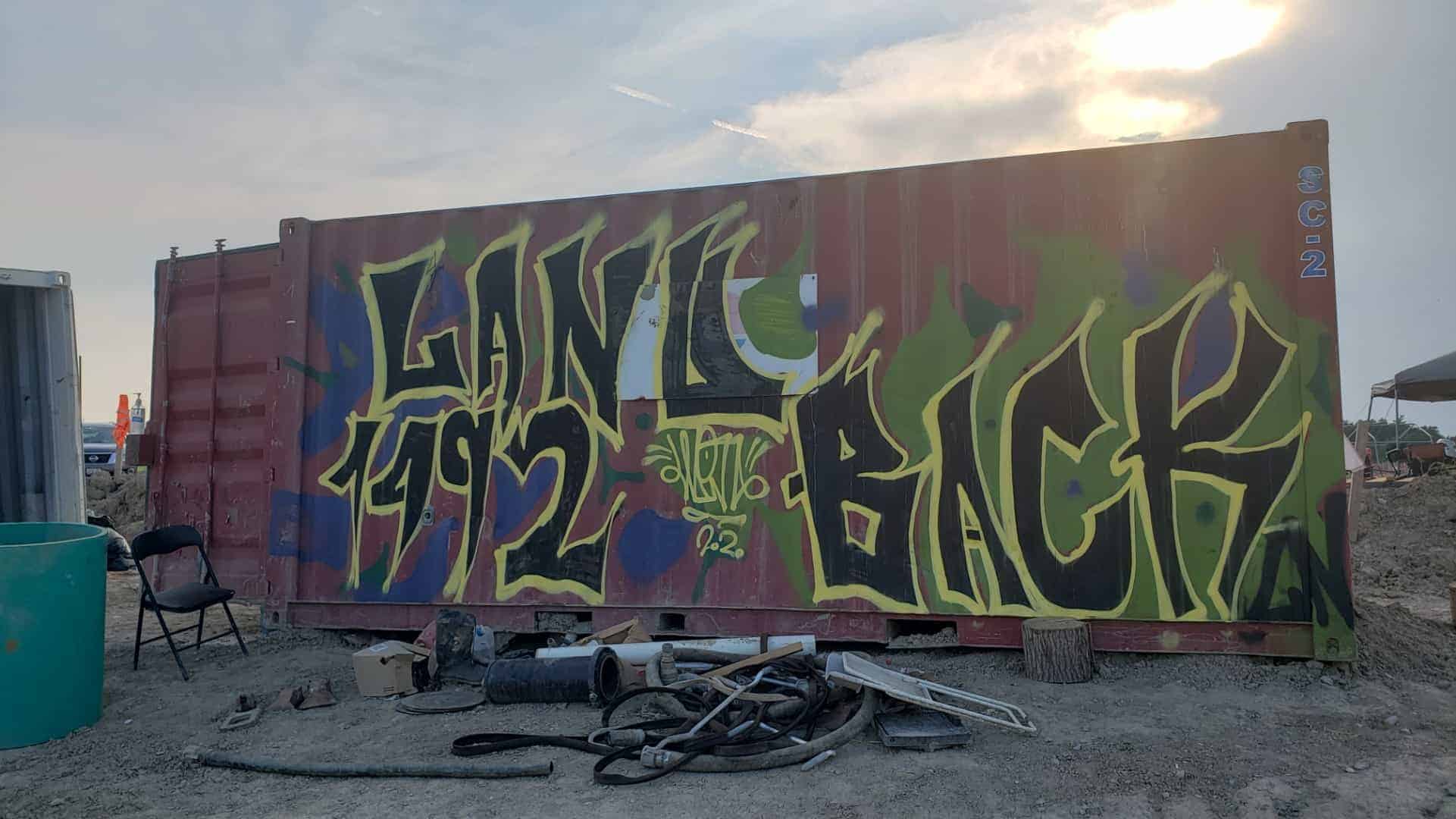- About
- Research
-
-
- Special Reports & Features
- The Rematriation of Indigenous Place Names
- Braiding Accountability: A Ten-Year Review of the TRC’s Healthcare Calls to Action
- Buried Burdens: The True Costs of Liquified Natural Gas (LNG) Ownership
- Pretendians and Publications: The Problem and Solutions to Redface Research
- Pinasunniq: Reflections on a Northern Indigenous Economy
- From Risk to Resilience: Indigenous Alternatives to Climate Risk Assessment in Canada
- Twenty-Five Years of Gladue: Indigenous ‘Over-Incarceration’ & the Failure of the Criminal Justice System on the Grand River
- Calls to Action Accountability: A 2023 Status Update on Reconciliation
- View all reports.
- Special Reports & Features
-
-
- Yellowhead School
-
- The Treaty Map
- LIBRARY
- Submissions
- Donate
ON SEPTEMBER 3rd, police arrested and charged one of our colleagues, Courtney Skye. Courtney was charged with disobeying a court order and mischief in relation to 1492 Land Back Lane.
Indigenous people defending their land from unwelcome development is perhaps the longest trend in North America. The fact that land defenders continue to be criminalized for asserting their rights and laws reflects ongoing colonization in Canada.
As Haudenosaunee women stated in August: “Courts violate and criminalize the rights and responsibility of our women by preventing us from fulfilling our responsibilities to the land and our future generations in accordance with Haudenosaunee Law.”
Yet, the path that government and industry prefer to ending these disputes is through violence, and specifically the injunction.
Injunctions are a blunt weapon used to deny Indigenous jurisdiction. Yellowhead research shows that almost one hundred percent of injunctions filed against First Nations by industry and governments involve resource extraction or development and most are granted in their favour. What follows is the militarization of Indigenous lands and the criminalization of land defenders.
In response to this excessive force, in part, numerous Inquiries and Commissions in Canada have called for the end to the criminalization of Indigenous people.
In Ontario, twenty-five years ago this week, the Ipperwash Inquiry called for wholesale change and recommended that the “provincial government should develop a policy governing the use of injunctions at Aboriginal occupations and protests. The policy should state that its purpose is to promote peacekeeping in Aboriginal occupations and protests.”
More broadly, “Bridging the Cultural Divide: A Report on Aboriginal People and Criminal Justice in Canada” (Royal Commission on Aboriginal Peoples, 1996) and the “Report of the Aboriginal Justice Inquiry of Manitoba” (A Public Inquiry into the Administration of Justice and Aboriginal People, 1991) called for transformation of the criminal justice system.
Tragically few of the recommendations in these Commissions or Inquiries have been taken up. Earlier this year, Canada’s Corrections Ombudsman, citing the dramatically rising rates of incarceration of Indigenous people, noted that corrections in Canada was becoming “Indigenized” (in other words, the people in the system are more and more, Indigenous).
The rising use of injunctions and increasing criminalization of Indigenous people are linked.
We, the Executive and Associate members of the Yellowhead Institute, joined by members of the Indigenous Faculty at Ryerson University, call for the following:
- We call on the Attorney-General of Ontario to drop all charges against our colleague Courtney Skye, and others arrested in relation to land defence at 1492 Land Back Lane, dating back to September 2nd;
- We also call on the Province of Ontario to develop policy prohibiting the use of injunctions on Indigenous people in cases of disputes over land use; and finally,
- We call on the Federal Government to engage with the volumes of evidence on criminal justice reform and Land Back.
Signed,
HAYDEN KING (Anishinaabe, Beausoleil First Nation)
Executive Director, Yellowhead Institute;
Assistant Professor, Sociology, Ryerson University
DAMIEN LEE (Anishinaabe, Fort William First Nation)
Associate Fellow, Yellowhead Institute;
Assistant Professor, Sociology, Ryerson University
EVA JEWELL (Anishinaabekwe, Deshkan Ziibiing)
Associate Fellow, Yellowhead Institute;
Assistant Professor, Sociology, Ryerson University
SHIRI PASTERNAK
Research Director, Yellowhead Institute; Assistant Professor, Criminology, Ryerson University
MEGAN SCRIBE (Ininiw iskwew, Norway House Cree Nation)
Associate Fellow, Yellowhead Institute;
Assistant Professor, Sociology, Ryerson University
LYNN LAVALLEE (Anishinaabek Qwe, Métis Nation of Ontario)
Strategic Lead, Indigenous Resurgence, Faculty of Community Services; Professor, School of Social Work, Ryerson University
ANNA FLAMINIO (Metis from St. Louis, Saskatchewan)
Assistant Professor, Criminology, Ryerson University
LILA PINE (Mi’Gmaq)
Professor, RTA School of Media; Director, Saagajiwe, Ryerson University
ANNE SPICE (Tlingit, Kwanlin Dun First Nation)
Acting Assistant Professor, Geography and Environmental Studies, Ryerson University
MICHAEL MIHALICZ (Cree)
Assistant Professor, Entrepreneurship & Strategy and Indigenous Advisor, TRSM, Ryerson University
SCOTT FRANKS (Métis)
Assistant Professor, Faculty of Law, Ryerson University
RILEY KUCHERAN (Biigtigong Nishnaabeg)
Assistant Professor, School of Fashion, Ryerson University; Associate Director, Saagajiwe
SANDRA JUUTILAINEN (Oneida Nation of the Thames)
Assistant Professor, School of Nutrition, Ryerson University
JENNIFER MENESS (Eagle Clan, Algonquins of Pikwàkànàgan First Nation)
Acting Assistant Professor, English, Ryerson University
MADELINE WHETUNG (Michi Saagiig Nishnaabeg, Curve Lake First Nation)
Acting Assistant Professor, Geography and Environmental Studies
TEHANYATARI:YA’KS MARTIN (Kanyenkehá:ka (Mohawk), Six Nations Grand River Territory)
Assistant Professor, Languages, Literatures and Cultures, Ryerson University

